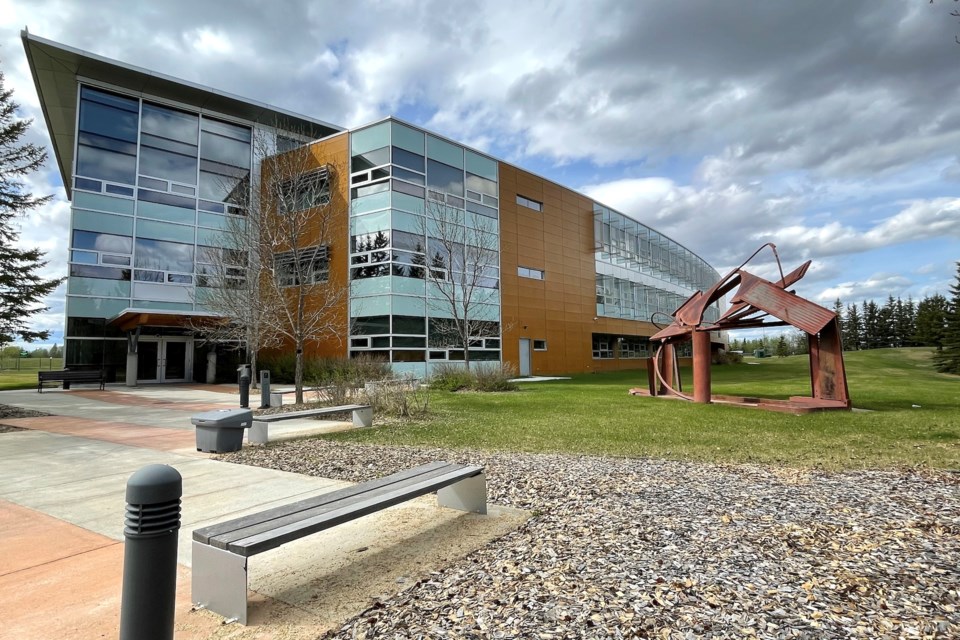ATHABASCA – A controversial bill that would allow the Alberta government to oversee research funding for universities is awaiting royal approval, but critics, including some at Athabasca University, say it's poorly thought out and unnecessary.
Faculty members, students, and administrative staff at Athabasca University have all expressed concerns with Bill 18, The Provincial Priorities Act, which passed third reading May 28. The bill still requires royal assent before it becomes law.
“Bill 18 threatens the academic freedom of researchers by allowing provincial politicians to decide which grants will be accepted,” said Athabasca University Faculty Association (AUFA) president Bob Barnetson. “Bill 18 is also likely to increase red tape, reduce grant funding, and make Alberta less able to attract and retain scholars.”
AUFA represents the more than 400 people who work as professional staff and academics at the school. The association has joined forces with the Confederation of Alberta Faculty Associations (CAFA) to advocate against the bill, which would place the province between universities and the three federal research agencies, also known as the tri-council.
In an April interview with CBC, Premier Danielle Smith said the province needed balance, implying universities aren’t producing enough conservative thinkers.
“If we did truly have balance in universities, then we would see that we would have just as many conservative commentators as we do liberal commentators,” said Smith. “Out of our journalism schools, we would see just as many conservative-minded journalists as we see liberal-minded journalists.”
Critics — including Barnetson and CAFA president Dr. Dan O’Donnell, who issued his own press release — have pointed out that tri-council funding isn’t partisan in nature. Grants are awarded by research committees comprised of expert researchers in the field, and the committees are publicly listed on the tri-council’s websites.
O’Donnell argued that the bill’s academic limitations do nothing but limit Albertan academics compared to peers in other provinces.
“Over the last thirty years, I’ve brought over $1 million in research grants to the University of Lethbridge and 90 per cent of that has gone in wages to support students at Alberta’s universities,” he said. “By restricting our ability to compete for federal dollars with other Canadian researchers on an equal playing field, all this bill does is ensure that universities in other provinces will have greater access to what used to be our share of federal research funding.”
On May 13, representatives from Alberta’s faculty associations met with the Minister of Advanced Education, Rajan Sawhney to request post-secondary institutions be exempt from the bill. Barnetson said the minister declined to do so, preferring to exempt tri-council funding from review through a ministerial exemption after the bill was passed.
“From a practical perspective, it is hard to fathom why post-secondaries would be included within the ambit of Bill 18 if the plan is to simply turn around and subsequently exclude the vast majority of federal funding,” said Barnetson.
Athabasca University has not put out a formal statement regarding Bill 18 yet, although the institution does stand to lose roughly $1.4 million in tri-council funding. A spokesperson for the school said AU president Dr. Alex Clark had been in discussions with the province about the potential ramifications of the bill, and the need for investment in research that addresses the challenges and opportunities in rural Alberta.
Tuition? Yes. Right to vote? No
AU’s Student Union (AUSU) has also been involved in lobbying the province. President Chantel Groening, an undergrad accounting student, was sworn in in April, and said she’s had her work cut out for her since then.
“We’ve addressed our key messaging to the Minister of Advanced Education regarding our concerns with Bill 18,” said Groening. “They’re hoping they have some exceptions to put in, but they haven’t given us any idea of what that looks like yet.”
Groening said the funding received by the university offsets the tuition costs for students. If the school loses the funding stream, she was worried students would be paying the remainder, a cost many can’t afford.
“We’re still trying to find out all the details so we can figure out how it’s going to impact us because we don’t know for sure,” said Groening. “If the exemptions remove post-secondary from the bill then we won’t have any concerns at all, but for now we’re still kind of navigating the situation.”
One unique concern for the AUSA is location — unlike a traditional brick-and-mortar university, many AU students don’t live in Alberta and can't vote in provincial elections. While this can make the job of a student advocate like Groening more challenging, she said the message she's heard from her peers has been consistent.
“I’m concerned about the Bill 18, a lot of our students are concerned,” said Groening. “At the end of the day, we need clarity. The federal government just released hundreds of millions of dollars in funding and that’s going to impact Athabasca.”



